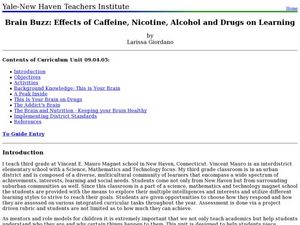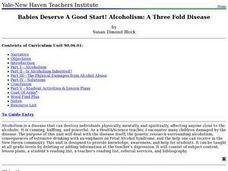Alcohol Education Trust
Talk About Alcohol: Why Are Young People Advised Not to Drink?
What should young people think about before drinking alcohol? Have your class consider the eight reasons listed here, some of which are facts, and others opinions. Pupils rank each statement from one to eight, where one is the most...
US Department of Health and Human Services
Alcohol: Why Drink When You Can…
Prepare your learners to make good decisions about drinking by providing them with the real facts about alcohol and substance abuse. This resource includes several worksheets explaining how alcohol affects the brain, as well as a general...
Curated OER
Full Circle Advertising: A Look at Teen Alcohol Use and Fetal Alcohol Syndrome
High schoolers analyze ads and learn about the effects of alcohol. Note that the PowerPoint mentioned in the procedure is not included, so you will need to prepare your own presentation. After the lecture, segue into fetal alcohol...
Curated OER
Sex And Alcohol: A Risky Mix
Students examine the reasons people use alcohol and discuss the negative things that can happen when mixing sex and alcohol. For this lesson on risky behavior, students explore the ways in which they can reduce the risks involved when...
Curated OER
Alcohol and Pregnancy Don't Mix!
Seventh graders learn about John Kellerman, a youngster who was born with Fetal Alcohol Syndrome. They learn how alcohol and pregnancy doesn't mix.
Curated OER
The Human Mind, Alcohol and the Brain
Students create a diagram showing the effects of alcohol on the brain and then create a lesson plan to teach this information to middle school students. They contact middle school teachers and make arrangements for students to actually...
Curated OER
What is BAC?-Blood Alcohol Concentration
In this blood alcohol worksheet, students read about the factors that affect a person's blood alcohol concentration. Students use a given formula to calculate the amount of alcohol in a list of four different drinks and apply their...
Curated OER
Brain Buzz: Effects of Caffeine, Nicotine, Alcohol and Drugs on Learning
Students understand how the brain functions and how they can promote a healthy lifestyle. In this health lesson students complete several activities including investigating how stimulates affect the brain.
Curated OER
Babies Deserve A Good Start! Alcoholism: A Three Fold Disease
Students study the basic disease concept of alcoholism. The determine that alcoholism is progressive and explore the levels of progression. They name the three factors contributing to the cause of alcoholism and explain each one with...
Curated OER
Alcoholic Fermentation in Yeast
Biology learners investigate the effect of sucrose concentration on yeast alcoholic fermentation. During the lesson,they compare and contrast the processes of cellular respiration and alcoholic fermentation. They design an experiment to...
Curated OER
Using Alcohol: Setting Limits
Students investigate how even low concentrations of alcohol affect a person's functioning. They examine alcohol-related risks affect both the individual and the public. They create a policy for alcohol use and defend its use.
Curated OER
Fetal Alcohol Syndrome
Students observes how drinking alcohol while pregnant affects the placenta with a simulation.
Curated OER
Under the Influence
Students examine the effects of teen drinking. In this personal health lesson plan, students research alcohol's effect on the teen brain. Students discuss their findings about the alcohol-brain connection and create brain maps.
Curated OER
The Effects of Alcohol and other Teratogens: A model using Zebrafish
Young scholars investigate the interference of various drugs on an embryo through experimentation. This is an open-ended lab to allow students to see effects of various chemicals humans choose to put in their bodies and create...
Curated OER
Health And Life Skills Outcomes
Students use skills that are directly related to alcohol, tobacco and other drug choices (e.g., refusal skills, decision making, stress reduction skills)
Curated OER
What's important? Knowing your facts, yourself and your role models
Third graders review safety rules about alcohol, tobacco and medicines. They learn healthy alternatives to using alcohol, tobacco and medicines. They recognize healthy and unhealthy choices
Curated OER
Enzymes
Tenth graders test their saliva for enzyme activity. In this enzyme lesson, 10th graders conduct an experiment to test the enzymatic activity of their saliva. They relate the lack of certain digestive enzymes with alcoholism.
Curated OER
Effects of Drugs and Alcohol
Students examine how drugs and alcohol impair athletic performance They discuss the reduction in aerobic activity through drug use and discover what is most affected by abuse. In their journals they write about how maintaining...
Curated OER
Ethyl Alcohol
In this ethyl alcohol worksheet, high schoolers read about the characteristics of ethanol including the effects it has on the body when ingested and digested. This worksheet has 2 short answer questions.
Curated OER
Someone in the Class - Children of Alcoholics
High schoolers analyze addiction in families. In this children of alcoholics lesson students answer questions, complete an activity and play a game.
Curated OER
Sobriety Testing Stations
Students identify each of the different sobriety tests and how they are used to detect the amount of alcohol consumed by a person and the physical affects of drinking alcohol.
Curated OER
How Does Advertising Affect You?
Students understand what advertisements are trying to do and how they do it
American Chemical Society
Why Does Water Dissolve Sugar?
Did you know that if you wait long enough, the M on the outside of an M and M will float to the surface when submerged in water? Learners observe the sugar coating of an M and M while it is dissolving in water. They explain how this...
Social Skills Central
Ready, Set, Respond!
When faced with a difficult situation, do you respond selfishly, face it head on, or ignore the problem? This game encourages learners to evaluate the wide range of reactions we can have to problematic situations, and how our responses...

























